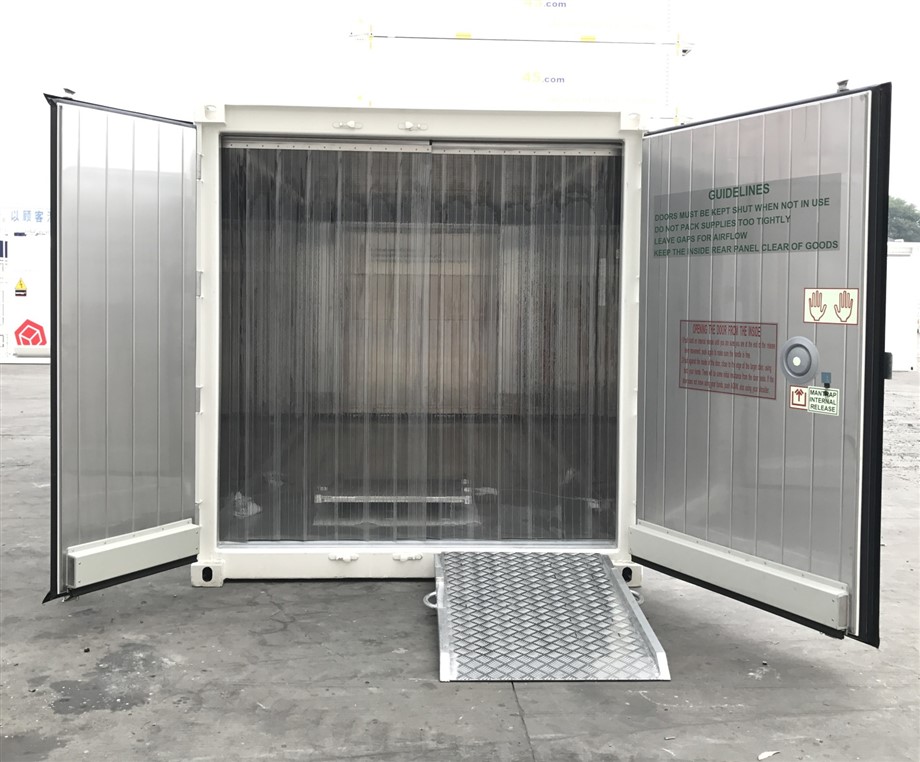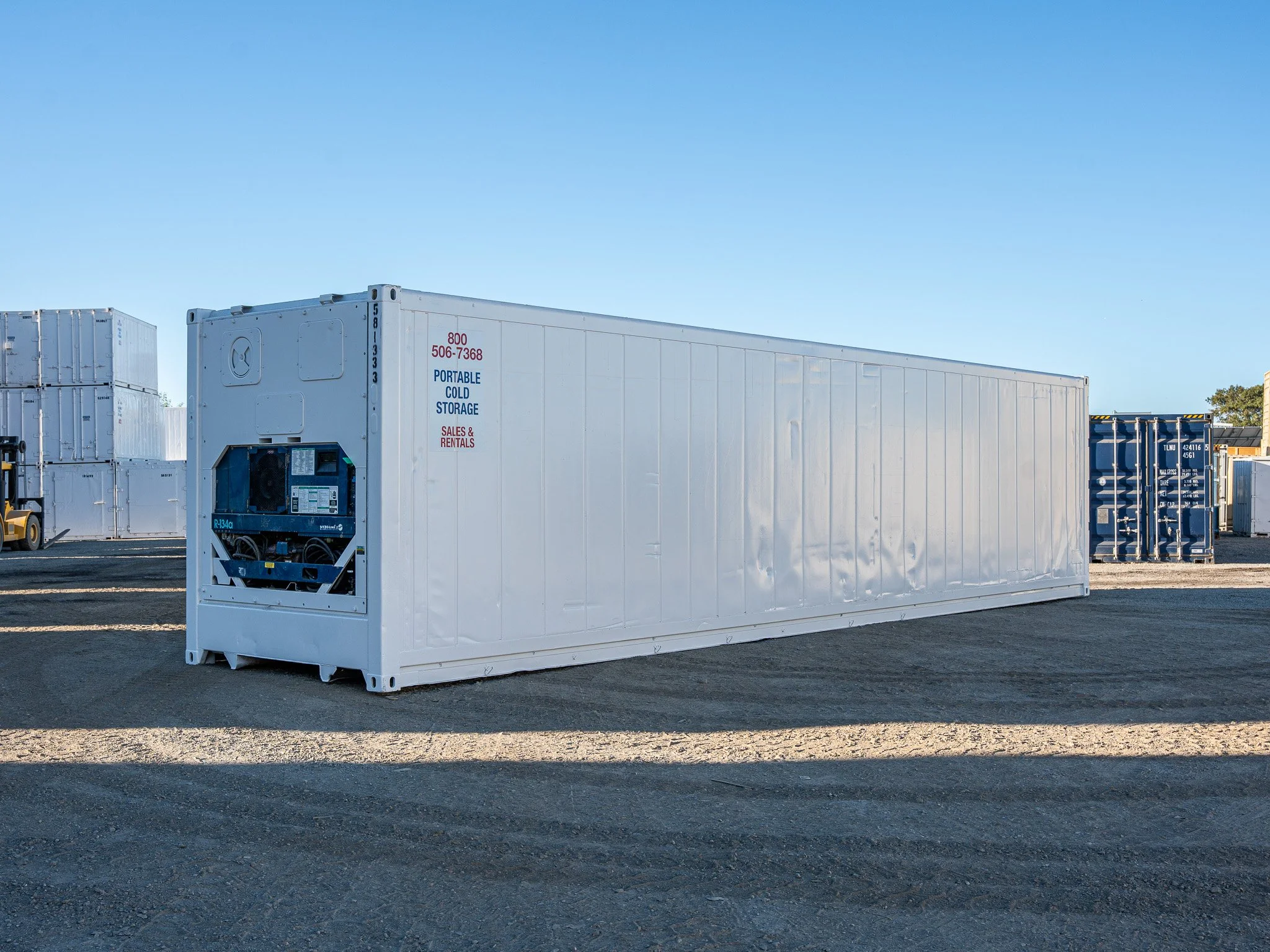Everything About Freezer Containers: Crucial Insights for Your Storage Space Requirements
Freezer containers play an important function in the conservation of perishable products. They come in different types, including refrigerated and protected systems, each developed for certain storage requirements. Comprehending the benefits and essential features of these containers is essential for businesses intending to optimize their procedures. As the need for efficient storage space remedies expands, checking out the different options offered can result in informed decisions that influence both profitability and sustainability. What factors should one consider when picking the appropriate container?
Kinds of Cold Store Containers
Cold storage space containers been available in numerous types, each designed to fulfill details temperature level control demands. Among the most typical types are cooled containers, which maintain temperature levels between 0 ° C to 10 ° C, making them suitable for subject to spoiling products like fruits, veggies, and dairy items. An additional kind is the deep freezer container, which operates at temperatures listed below -18 ° C, perfect for lasting storage of icy items such as meats and seafood.
Protected containers offer temperature security without active cooling, making them helpful for short-term transportation of temperature-sensitive products. In addition, there are mobile freezer devices, which offer flexibility in areas and are commonly made use of in occasions or seasonal procedures. Finally, blast refrigerators quickly decrease the temperature level of warm foods, making certain safety and security and quality. Each type serves an unique function in numerous sectors, from food service to drugs, emphasizing the importance of selecting the ideal container for specific storage space needs.

Benefits of Using Cold Store Solutions

Chilly storage solutions prolong the shelf life of things, minimizing waste and increasing earnings for businesses. By successfully managing inventory with appropriate temperature level control, firms can optimize their supply chains and improve operational effectiveness.
Furthermore, cool storage centers permit for flexible storage space alternatives, suiting different quantity requirements and seasonal changes in need (used 40ft refrigerated shipping containers). This adaptability aids organizations react swiftly to market changes
Finally, using cold storage space solutions can guarantee compliance with health and wellness regulations, securing both companies and customers. Generally, the tactical use chilly storage space boosts product management while advertising sustainability and economic feasibility.
Trick Attributes to Look for in Cold Storage Space Containers
When selecting cold store containers, several essential attributes merit mindful consideration to protect peak efficiency and dependability. Initially, temperature control capacities are necessary; containers should maintain constant temperature levels appropriate for certain items. Insulation high quality likewise plays a significant role, as remarkable insulation reduces energy consumption and improves temperature level security.
Next off, convenience of gain access to and loading is crucial; containers need to offer user-friendly layouts for efficient handling and organization. Durability is one more important element; weather-resistant materials guarantee durability and guard components versus ecological variables.
Additionally, mobility features, such as built-in wheels or lifting factors, promote transportation, while adjustable designs permit tailored storage solutions.
Checking systems, including temperature alarms and remote tracking, give real-time updates, making certain that problems stay perfect. By concentrating on these features, customers can choose chilly storage space containers that fulfill their operational needs efficiently.
Picking the Right Cold Storage Space Container for Your Demands
Selecting the right cold storage space container needs a thoughtful evaluation of certain needs and operational requirements. Elements such as the kind of products being stored, temperature level sensitivity, and quantity needs to be focused on. Subject to spoiling food products may demand containers with rigorous temperature controls, while drugs may require precise conditions to keep efficacy.
In addition, potential users must consider the container's dimension and mobility. A bigger unit might be required for bulk storage, while smaller sized, portable alternatives might be perfect for on-site or short-term requirements. Insulation quality and energy efficiency are also important, as these will impact operational prices and temperature stability.
Compliance with industry guidelines and criteria is important, specifically in markets like food and health care. By very carefully examining these aspects, customers can pick a cold store container that effectively satisfies their special demands and guarantees optimum storage space problems.
Ideal Practices for Maintaining Cold Store Conditions
Preserving ideal chilly storage conditions is necessary for preserving the top quality and security of temperature-sensitive items. On a regular basis monitoring temperature level and moisture levels is vital; using dependable electronic thermostats and hygrometers can offer accurate readings. Proper insulation of cool storage space containers assists reduce temperature level changes and power loss.
Implementing a first-in, first-out (FIFO) system assures that older stock is used before more recent supply, lowering waste (used 40ft refrigerated shipping containers). Additionally, keeping an organized format within the storage space enables far better airflow and reduces the threat of cross-contamination
Regular maintenance checks on devices, such as seals and compressors, are very important to avoid breakdowns. Personnel training on finest methods for packing and unloading items assists preserve temperature honesty. Keeping doors closed as much as possible limitations heat exchange, guaranteeing that the cold storage space atmosphere stays stable and reliable in protecting valuable items.
Expense Considerations for Cold Storage Space Solutions
When assessing chilly storage services, it is vital to consider the first investment costs alongside continuous functional costs. A complete malfunction of these prices can expose considerable lasting savings capacity for services. Understanding these economic elements helps stakeholders make educated choices concerning their cool storage requirements.

Initial Financial Investment Expenses
The financial landscape of freezer containers presents numerous preliminary investment expenses that services need to think about. These costs typically consist of the acquisition or rental cost of the containers, which can differ based upon dimension, insulation, and kind quality. In addition, expenditures associated with retrofitting existing structures to fit cold storage space needs to be factored in, especially if specialized tools is called for. Setup costs, consisting of electric work and refrigeration systems, likewise add to the overall first investment. Organizations must not forget transport expenses for delivering containers to their preferred place. Ultimately, possible personalization options, such as shelving or temperature level monitoring systems, can even more affect the initial monetary expense. Mindful budgeting for these aspects is necessary for effective cold store application.
Functional Expenses Malfunction
Operational costs for freezer remedies encompass numerous critical price considerations that companies should browse. Key aspects include power prices, which can be considerable because of the demand to keep low temperatures. Maintenance expenses are likewise significant, as routine servicing is important to assure devices operates successfully and stays certified with health and safety and security standards. Furthermore, labor expenses may develop from the demand for specialized staff to handle and check the storage space atmosphere. Insurance expenditures are one more factor to consider, as business must shield their financial investments against potential losses. Finally, any kind of prospective regulative compliance expenses should be factored in, as companies might require to purchase systems that stick to food safety and environmental guidelines. Understanding these expenditures is critical for effective budgeting.
Long-Term Financial Savings Prospective
Investing in cold store solutions offers significant long-lasting cost savings potential, transforming initial expenditures into financial effectiveness in time. By minimizing wasting and waste, organizations can enhance their revenue margins significantly. Advanced insulation and energy-efficient systems reduce utility costs, which accumulate over the life expectancy of the equipment. Chilly storage containers typically call for much less constant upkeep compared to conventional refrigeration methods, leading to lower repair service costs. The ability to store products read more for extended periods without jeopardizing quality permits businesses to take advantage of market variations, maximizing revenue. Additionally, the scalability of cold store services allows firms to adapt to changing demands without incurring excessive costs. Generally, these aspects add to a compelling situation for cold store as an affordable financial investment approach.
Often Asked Concerns
Exactly How Lengthy Can Food Be Saved in Freezer Containers?
The period food can be saved in freezer containers differs by type. Normally, subject to spoiling things last from days to weeks, while frozen foods can stay risk-free for months, relying on proper temperature level and storage conditions.
Are Freezer Containers Energy-saving?
The power effectiveness of freezer containers differs based upon design and insulation high quality. Modern devices frequently utilize sophisticated technology to lessen energy intake, ultimately adding to decreased functional costs and ecological influence in long-term usage.
Can Freezer Containers Be Custom-made for Particular Requirements?
Freezer containers can without a doubt be tailored to fulfill certain needs. Alterations might consist of temperature level controls, size modifications, and additional attributes, enabling individuals to customize options successfully for numerous storage needs and operational preferences.
What Are the Common Dimensions of Cold Store Containers?
Freezer containers normally can be found in standard sizes such as 10, 20, and 40 feet. These measurements suit different storage requirements, guaranteeing versatility for businesses requiring temperature-controlled atmospheres for perishable goods or sensitive products.
Do Freezer Containers Require Unique Licenses for Usage?
Cold store containers commonly need unique licenses for use, depending on local guidelines and meant applications. Authorities may mandate licenses to guarantee safety and security requirements, environmental compliance, and correct operational practices are preserved during their application.
Cold storage space containers come in various types, each made to fulfill certain temperature level control needs. Furthermore, cold storage centers allow for versatile storage options, fitting numerous quantity demands and seasonal fluctuations in need. Picking the ideal chilly storage space container requires a thoughtful assessment of functional demands and details needs. The financial landscape of cold storage containers provides numerous preliminary financial investment prices that services should consider. Cold storage space containers can without a doubt be personalized to meet specific demands.